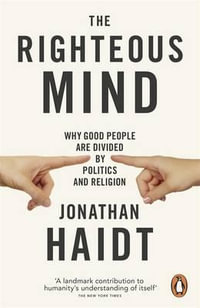"Polarization is the story of American politics today. It affects almost every aspect of American political life and has been studied by scholars from many different angles, with dozens of good historical and experimental approaches. Wouldn't it be great if someone would digest all these studies, synthesize them and produce a readable book that makes sense of it all? Ezra Klein has done just that with his compelling new work,
Why We're Polarized. . . . Powerful [and] intelligent."
--Fareed Zakaria, CNN "Why We're Polarized delivers. . . . What Klein adds especially to [is] our understanding of how we got here--why Trump is more a vessel for our division than the cause, and why his departure will not provide any magical cure. . . . A thoughtful, clear and persuasive analysis." --Norman Ornstein, New York Times Book Review
"Superbly researched and written . . . Why We're Polarized provides a highly useful guide to this most central of political puzzles, digesting mountains of social science research and presenting it in an engaging form. . . . An overall outstanding volume." --Francis Fukuyama, The Washington Post
"Brilliant and wide-ranging. A book about what just might be our central, perhaps fatal problem. This is the kind of book you find yourself arguing with out loud as you read it and will stick in your head long after you've finished. Absolutely crucial for understanding this perilous moment." --Chris Hayes, host of "All In with Chris Hayes" on MSNBC and author of A Colony in a Nation
"Klein's careful book explains how different groups of Americans can see politics through such different lenses, examining how various psychological mechanisms allow committed partisans to rationalize almost anything their party does. . . . This book fully displays the attributes that have made Klein's journalism so successful." --Dan Hopkins, Washington Post
"Eye-opening . . . Klein's brilliant diagnosis and prescription provide a path to understanding--and healing." --O Magazine
"A fascinating book, rich in politics, history, psychology and more." --David Leonhardt, New York Times
"Well worth reading." --Andrew Sullivan, New York magazine
"Ezra Klein's new book somehow reads as if it were written after the election. For anyone concerned about how polarized we have become--and why--this book is for you." --Andrew Yang, author of The War on Normal People
"Klein writes captivatingly well. Reading Why we're Polarized is like having a conversation with a brilliant, extremely persuasive friend who has read everything and who is armed with scores of studies that he's able to distill into accessible bites." --Amy Chua, Foreign Affairs
"Even at his most wonky, a deep strain of humanism runs through [Klein's] journalism and that infuses his new book, Why We're Polarized." --Krista Tippett, On Being
"In this thoughtful exploration of American politics, Ezra Klein challenges the conventional wisdom about why and how recently we've come apart, and suggests that the fantasy of some unified American middle is perhaps at odds with the ongoing fight for truly representational politics. Why We're Polarized makes the compelling case that the centuries-long battle to perfect our union means we were built to be split; Klein's provocative question is whether America's democratic systems and institutions can bear up under the weight of our divides." --Rebecca Traister, New York Times bestselling author of Good and Mad
"Something has gone terribly wrong with American politics in the last decade or so, and Klein gives us the clearest and most comprehensive analysis I have seen. He shows how we entered the realm of political 'mega identity politics, ' and how feedback loops between our tribal psychology and our rapidly evolving media ecosystem may be driving our democracy over a cliff. The book reviews so many studies that in lesser hands it would earn the label 'wonkish, ' but Klein's writing is so good that it is a joy to read, even as you experience a range of negative emotions from what you are reading." --Jonathan Haidt, Thomas Cooley Professor of Ethical Leadership, New York University--Stern School of Business, author of The Righteous Mind, Co-author of The Coddling of the American Mind
"A sharp explanation of how American politics has become so discordant . . . Deeply insightful . . . A clear, useful guide through the current chaotic political landscape." --Kirkus Reviews (starred review)
"A timely, thought-provoking debut . . . This precise and persuasive guide helps to make sense of the current state of American politics. . . . Political junkies as well as general readers will learn from his analysis of the U.S. media landscape." --Publishers Weekly
"Klein's accessible work is for anyone wondering how we got here; it shows how understanding history can help us plan for the future. . . . By combining political history with social commentary, this book will retain relevancy." --Library Journal
"By weaving together a composite of group psychological theory and political history in the trademark, rigorously logical style of Vox's Explainer series, journalism, Klein traces the path of polarization from a time when the Republican and Democratic parties were virtually indistinguishable from each other to today." --Emma Levy, Seattle Times
"It's been a long time since I learned so much from one book. [Klein] shows just how broken the American political system is." --Rutger Bregman, author of Utopia for Realist
























